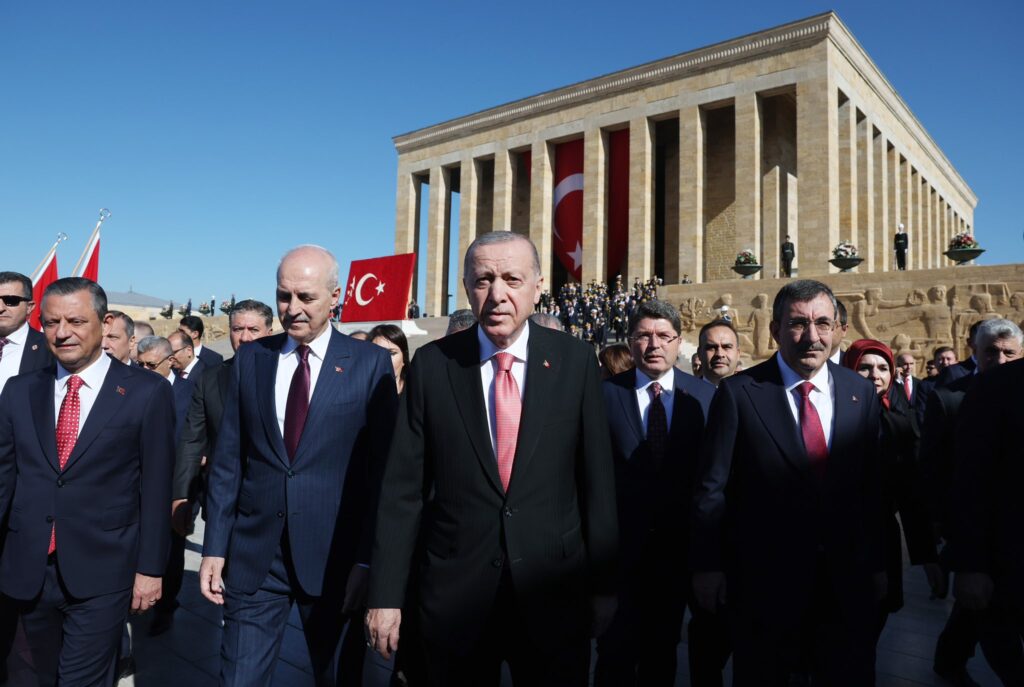Turkey’s political leaders marked the 101st anniversary of the republic on Tuesday, proclaiming messages of unity and perseverance, Deutsche Welle’s Turkish edition reported on Tuesday.
However, some messages underscored continuing rifts as President Recep Tayyip Erdoğan called for victory over terrorism and opposition representatives called for a return to the founding ideals of the republic under Mustafa Kemal Atatürk, the founder of modern Turkey.
In a televised speech on the anniversary, Erdoğan praised Turkey’s achievements over the past century and called for “terrorism to be banished to history.”
“We are experiencing the joy and justifiable pride of reaching the first anniversary of the new century of our republic,” Erdoğan said, adding that “every inch of progress has been hard-earned and remains under threat.”
The president invoked the memory of Atatürk, calling him the “founder” of Turkey’s “last and eternal link” in a chain of empires. Erdoğan’s critics, however, argue that his government has strayed from Atatürk’s secular principles and that authoritarian measures have eroded freedoms, calling his legacy into question.
In his message the president also addressed ongoing economic problems, pointing to the pressures many people face in a country where inflation has soared and standards of living have fallen. “We are aware of the difficulties caused by efforts to destabilize our country, especially the economy, over the past six years,” Erdoğan said. His remarks came amid ongoing economic challenges, which critics say have worsened during his two decades in office.
Erdoğan’s ruling Justice and Development Party (AKP) has been criticized for policies that critics say put loyalty above expertise, contributing to economic instability.
In his remarks Erdoğan promised to fight the “scourge of terror” that has been devouring Turkey’s resources and undermining national goals for decades. Yet his government has often labeled political dissent as “terrorism” and targeted opposition figures and journalists, an approach that critics say undermines both national unity and democracy.
Foreign Minister Hakan Fidan reinforced Erdoğan’s message by celebrating Turkey’s independence fighters and promising a “national foreign policy vision” to establish Turkey on the world stage.
Opposition leaders focused their messages on the erosion of Atatürk’s founding principles, which they say are being jeopardized by the Erdoğan government. Özgür Özel, leader of the opposition Republican People’s Party (CHP), emphasized the republic’s commitment to social justice and equality in a video message. “We will work tirelessly to ensure that our republic, which was founded as the ‘protector of the oppressed,’ achieves the goals set by our founder Gazi Mustafa Kemal Atatürk,” Özel said, calling for a renewed commitment to secular values and inclusivity. While Erdoğan often refers to Atatürk in his speeches, Özel’s comments point to a growing gap between the ideas of the Turkish state’s founder and what is practiced today.
Ankara Mayor Mansur Yavaş also took the opportunity to call for a return to the republic’s core values, which he believes are essential to tackling Turkey’s growing problems. Under the hashtag #EnBüyükBayram, or “The Greatest Holiday,” Yavaş stated, “The centuries-old achievements of the republic are etched in the minds and hearts of the great Turkish nation. Returning to the founding principles of our republic is the only solution to all the problems we face today. Long live the republic!”
İstanbul Mayor Ekrem İmamoğlu called for a renewal of Turkey’s democratic legacy on the occasion of the holiday as the republic enters its second century.
İmamoğlu described the 101st Republic Day as “the first day of the republic in the second century” and highlighted Atatürk’s vision of a people-led republic, which he contrasted with the current leadership that many believe is consolidating power rather than distributing it. “The republic is the legacy of our founder and the will of the people,” he said, calling on Turkey to preserve this legacy.
The leader of the Nationalist Movement Party (MHP), Devlet Bahçeli, a close ally of Erdoğan, reiterated his tough stance, claiming that Turkey “has “no Kurdish problem” — a controversial claim in a country with a significant Kurdish population and a long history of ethnic tensions.
The Kurdish problem is a term prevalent in Turkey’s public discourse that refers to the demand for equal rights by the country’s Kurdish population and their struggle for recognition.
“The Republic of Turkey does not have a Kurdish problem and never will,” Bahçeli said, emphasizing that the real threat is “separatist terrorism.”
Bahçeli’s remarks come after the MHP leader shocked observers last week by extending an olive branch to Abdullah Öcalan, the jailed leader of the outlawed Kurdistan Workers’ Party (PKK).
Bahçeli suggested that Öcalan, the leader of the PKK, which has been leading an armed insurgency against Turkey’s security forces since 1984 in a campaign that has claimed the lives of some 40,000 people, can speak in the Turkish parliament and dissolve the PKK, bringing up the possibility of the latter’s release.
Although it may seem contradictory, Bahçeli’s denial of a Kurdish problem suggests that any move to release Öcalan or address Kurdish grievances will be carefully framed by the government to appease nationalist constituents. Rather than presenting it as a concession, the government may portray the rapprochement as the PKK’s submission.
The anniversary messages reflect the political tensions in Turkey, as each side calls for unity while espousing differing visions of the republic’s future. As Turkey enters what Erdoğan has called the “Century of the Republic,” analysts note that the road ahead remains uncertain as national unity seems elusive.

